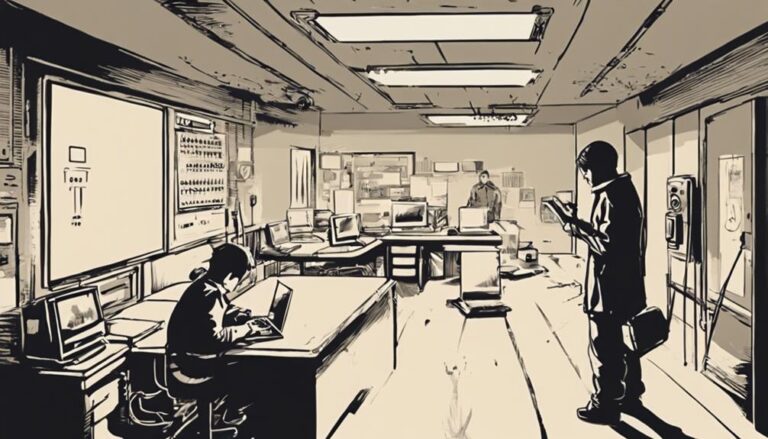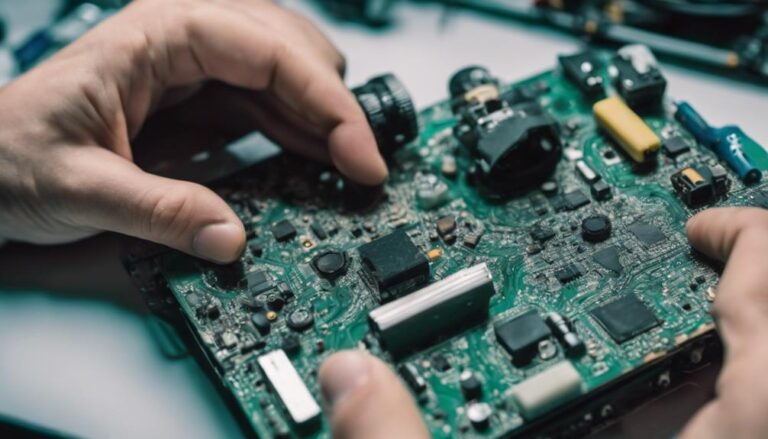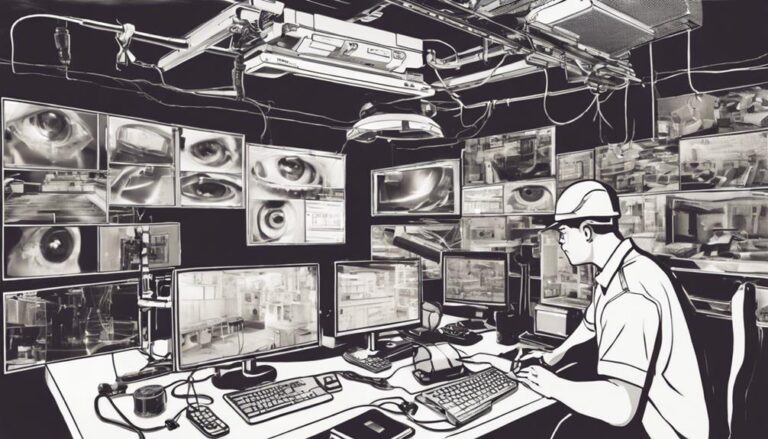CCTV cameras can work without light, but it depends on their type and technology. Standard cameras struggle in complete darkness, while night vision cameras can operate effectively in low-light conditions by amplifying existing light or using infrared technology. Infrared cameras are especially good at capturing clear images even when it's pitch black. If you're considering a CCTV system, it's important to understand your needs for night-time surveillance. Choosing the right camera can guarantee you have a thorough security solution that meets your requirements, so exploring further can provide you with valuable insights.
Understanding CCTV Technology
CCTV technology is often misunderstood, but it plays an essential role in modern security systems. You might think that these cameras are just tools for surveillance, but their purpose goes beyond mere observation. They're designed to enhance your safety and protect your freedoms. By allowing you to monitor your surroundings, CCTV can deter crime and provide peace of mind, helping you feel secure in your own space.
Many people fear that CCTV infringes on privacy, but when used responsibly, it can actually empower individuals. Imagine having the ability to check in on your property from anywhere, ensuring that your home remains a safe haven. With advancements in technology, you can even access live feeds from your smartphone, putting control right in your hands.
Understanding how CCTV works can help alleviate concerns. These systems capture video footage, which can be stored for later review. They can operate around the clock, even in low-light conditions, thanks to infrared technology. This means that whether it's day or night, you've got eyes on your property.
Moreover, CCTV systems can be integrated with alarms and motion detectors, creating a thorough security network. This synergy allows for rapid responses to potential threats, protecting not just your belongings but your peace of mind as well. Remember, embracing CCTV technology doesn't mean sacrificing your freedom; it can be a powerful ally in safeguarding your rights and your space.
Types of CCTV Cameras
When it comes to security, choosing the right type of camera can make all the difference. You've got several options, each tailored to meet specific needs and preferences. Understanding these types can empower you to take control of your security situation.
First up, you have the dome camera. These are discreet and often blend into their surroundings. They're perfect for indoor use, providing a wide-angle view while keeping potential intruders guessing about where the camera is pointed. Then there are bullet cameras, which are more visible and great for outdoor settings. Their elongated design allows for focused viewing, making them ideal for monitoring specific areas.
Another option is the PTZ (pan-tilt-zoom) camera. If you want flexibility, this is the one for you. You can control the camera remotely to pan, tilt, or zoom in on specific activities. This gives you a broader range of coverage and the ability to zoom in on details when needed.
There are also IP cameras, which connect to your network, allowing for easy remote access. With these, you can keep an eye on your property from anywhere, giving you the freedom to stay connected.
Lastly, there are wireless cameras, which eliminate the hassle of cables and can be placed almost anywhere. They offer convenience and mobility, making it easy to adapt your security setup.
Choosing the right type can enhance your sense of safety and freedom, so weigh your options carefully.
Low-Light Performance
Selecting the right camera goes beyond just the type; it's also about how well it performs in various lighting conditions. Low-light performance is vital if you want reliable surveillance without the need for constant lighting. Many standard cameras struggle in dim environments, leading to grainy footage that can obscure important details. This is where you need to focus on specifications that matter.
Look for cameras with larger sensors and higher ISO capabilities, as they can gather more light and produce clearer images in low-light situations. Cameras with back-illuminated sensors can also be beneficial—they're designed to enhance low-light performance, giving you more freedom to monitor your surroundings effectively, even after the sun goes down.
Also, consider the aperture size. A wider aperture allows more light to enter, improving the camera's ability to capture clear images in the dark. This means you won't have to compromise on quality just because the natural light fades.
If freedom is your goal, you'll want a camera that adapts well to its environment, providing you peace of mind without the worry of poor visibility. However, remember that no camera is perfect in total darkness; understanding the limitations of your chosen model is key. By prioritizing low-light performance, you're taking a significant step toward securing your space, ensuring you can maintain the control and oversight you desire, regardless of the hour.
Night Vision Technology
Night vision technology has revolutionized surveillance, allowing you to see clearly in complete darkness. This technology employs advanced sensors that amplify existing light, making it possible to capture images in low-light or no-light environments. Whether you're monitoring your property, ensuring safety in your neighborhood, or just keeping an eye on things after dark, night vision cameras give you the freedom to observe without being hindered by the absence of light.
You might be wondering how it works. Night vision devices typically utilize either image intensifier tubes or thermal imaging. Image intensifiers boost the small amount of light available, including infrared light that's invisible to the human eye. This means even the faintest illumination can be transformed into detailed images. On the other hand, thermal imaging detects heat emitted by objects, allowing you to see living beings or vehicles even when there's no visible light.
Using night vision technology enhances your security capabilities. You can monitor your surroundings without the need for intrusive lighting that could alert unwanted visitors. It empowers you to take action, ensuring your safety and that of your loved ones. Plus, with the advancements in this technology, you'll find a variety of options available, fitting various budgets and needs.
In a world where freedom and security go hand in hand, night vision technology stands as a critical tool. It gives you the ability to keep watch when darkness falls, ensuring you're always aware and in control, no matter the hour.
Infrared vs. Standard Cameras
In the domain of surveillance, understanding the differences between infrared and standard cameras is essential for making informed choices. You want a security solution that fits your needs, and knowing how these two types of cameras operate can help you decide which is right for your situation.
Standard cameras capture images using visible light. They're great when there's adequate lighting, but they struggle in low-light conditions. If you rely solely on standard cameras, you might find yourself with grainy or unclear footage at night. This could leave gaps in your surveillance, potentially compromising your safety and freedom.
On the other hand, infrared cameras are designed to excel in darkness. They use infrared light, which is invisible to the naked eye, allowing them to capture clear images even when the lights are off. This technology can be a game-changer for outdoor security, enabling you to monitor your property regardless of the time of day. If you value peace of mind and the ability to see what's happening around you at all hours, infrared cameras can be a valuable asset.
Ultimately, your choice between infrared and standard cameras will depend on your specific needs and the environment they'll be placed in. If low-light conditions are a concern, investing in infrared technology can help you maintain a constant watch over your space, granting you the freedom to feel secure, day or night.
Factors Affecting Image Quality
What influences the clarity and detail of the images captured by your surveillance cameras? Several factors play a significant role in determining the image quality, and understanding them can help you make informed choices for your security needs.
First, lighting conditions are essential. In low-light situations, cameras with higher sensitivity or infrared capabilities tend to perform better. If your camera's resolution is too low, even the best lighting won't help much, so choose a camera with at least 1080p resolution for sharper images.
Next, the lens quality matters. A higher-quality lens can greatly enhance image clarity by reducing distortion and glare. When selecting a camera, don't overlook this aspect.
Lastly, environmental factors can affect image quality as well. Dust, fog, or rain can obscure the view, impacting the footage captured. Regular maintenance and choosing weather-resistant cameras can mitigate these effects.
Here's a simple table summarizing these factors:
| Factor | Importance | Tips |
|---|---|---|
| Lighting | Essential for clarity | Use IR cameras for low-light areas |
| Resolution | Determines detail in images | Opt for 1080p or higher |
| Lens Quality | Affects sharpness and clarity | Invest in high-quality lenses |
Installation Considerations
When setting up your CCTV camera without light, several installation considerations come into play to guarantee peak performance. First, think about the camera's placement. You'll want to position it in areas where it can capture the most activity without obstructions. Avoid placing it too high or too low; a height of about eight to ten feet typically provides a balanced view.
Next, consider the type of camera you're using. Some models are designed specifically for low-light conditions, so make certain you're investing in one that fits your needs. If you're going for a standard camera, you might need additional equipment like infrared illuminators to enhance visibility in total darkness.
Also, pay attention to the angle of the camera. A wide-angle lens can be beneficial, allowing you to cover more ground, but be mindful that it may also reduce image clarity at longer distances. Adjusting the tilt and pan settings can help you focus on critical areas without compromising the overall view.
Wiring is another important aspect. Make sure your cables are secured and protected from environmental factors. Use weatherproof connectors if your setup is outdoors.
Lastly, don't overlook the power source. If you're in a remote area, consider solar-powered options or battery backups to make certain your camera remains operational. By carefully considering these factors, you can create a surveillance system that operates efficiently even in low-light situations, granting you the freedom to monitor your space without worry.
Benefits of Night Vision
With the rise of security concerns, the benefits of night vision technology in CCTV cameras have become increasingly evident. You want to feel secure in your own space, and night vision capabilities enhance that sense of safety even after the sun goes down. These cameras allow you to monitor your property in complete darkness, ensuring that you don't miss any suspicious activity.
One of the key advantages is improved visibility. Night vision cameras can capture clear images in low-light conditions, giving you peace of mind. Whether it's a late-night walk around the neighborhood or just checking your property after dark, you can rely on these devices to keep watch when you can't.
Moreover, night vision technology can act as a deterrent to potential intruders. Knowing that a property is under surveillance, even in the dark, can discourage criminal activity. This means you're not just protecting your belongings but also asserting your right to safety.
Additionally, many night vision cameras come equipped with motion detection features that alert you to any unusual movements. This real-time monitoring allows you to act quickly, whether that means contacting authorities or checking in with your neighbors.
In a world where freedom is paramount, knowing that your home is secure, day or night, empowers you. Embracing night vision technology for your CCTV system isn't just about surveillance; it's about taking control of your safety and enjoying the freedom to live without fear.
Common Misconceptions
Despite the growing popularity of CCTV cameras equipped with night vision, several misconceptions linger that can lead to confusion and hesitance in their adoption. One common myth is that night vision cameras can't operate without any light at all. In reality, while they're designed to work best in low-light conditions, many can still capture clear images in almost total darkness thanks to infrared technology.
Another misconception is that these cameras provide a false sense of security. While they're an excellent tool for monitoring, they shouldn't be your sole line of defense. It's crucial to combine them with other security measures to create a thorough strategy. Relying entirely on CCTV can leave gaps in your protection.
You might also think that night vision cameras are prohibitively expensive. While some high-end models can be pricey, there are plenty of affordable options available that don't sacrifice quality. It's about finding the right balance between your budget and your security needs.
Lastly, many believe that installing CCTV cameras is a complicated process. In truth, with the right resources, it can be straightforward. Most systems come with user-friendly instructions, and there are countless online tutorials to help you along the way.
Frequently Asked Questions
Can CCTV Cameras Record in Complete Darkness?
CCTV cameras can record in complete darkness if they're equipped with infrared technology. These cameras use infrared LEDs to illuminate the area, allowing them to capture clear footage even when there's no visible light. If you're considering a CCTV system for security, look for models that offer night vision capabilities. This way, you'll guarantee your property is monitored around the clock, giving you peace of mind and freedom from worry.
Do All CCTV Cameras Have Night Vision Capabilities?
Did you know that about 70% of CCTV cameras today come equipped with night vision capabilities? This means you can monitor your property even in low light conditions. However, not all cameras have this feature, so it's crucial to check the specifications before purchasing. You want to verify you're getting the freedom to safeguard your space effectively, whether it's day or night. So, always check if your chosen camera offers night vision!
How Do Weather Conditions Affect Camera Performance?
Weather conditions can greatly affect your camera's performance. Rain, fog, or snow can obscure the lens, reducing visibility. Extreme temperatures might impact the camera's electronics, causing malfunctions. In addition, glare from sunlight or reflections on wet surfaces can hinder image quality. To guarantee reliable surveillance, it's essential to choose cameras designed for various weather conditions, use protective housings, and regularly maintain them. This way, you can enjoy peace of mind, no matter the weather.
Are There Any Legal Restrictions on Using CCTV Cameras?
"Where there's a will, there's a way." However, when it comes to using CCTV cameras, you've got to tread carefully. Legal restrictions vary by location, often requiring consent for recording in private areas. You can't just set up cameras wherever you please; privacy laws protect individuals. Before installing, check local regulations to guarantee you're compliant. Remember, freedom comes with responsibility, so respect others' rights while safeguarding your own space.
Can I Retrofit My Existing Cameras for Night Vision?
Yes, you can retrofit your existing cameras for night vision. There are various options available, like adding infrared illuminators or upgrading to night vision-compatible lenses. Just be sure your current setup supports these modifications. It's a great way to enhance security without starting from scratch. Plus, it allows you to maintain your freedom of choice in surveillance while ensuring your property remains protected, day or night. Enjoy the peace of mind that comes with it!



